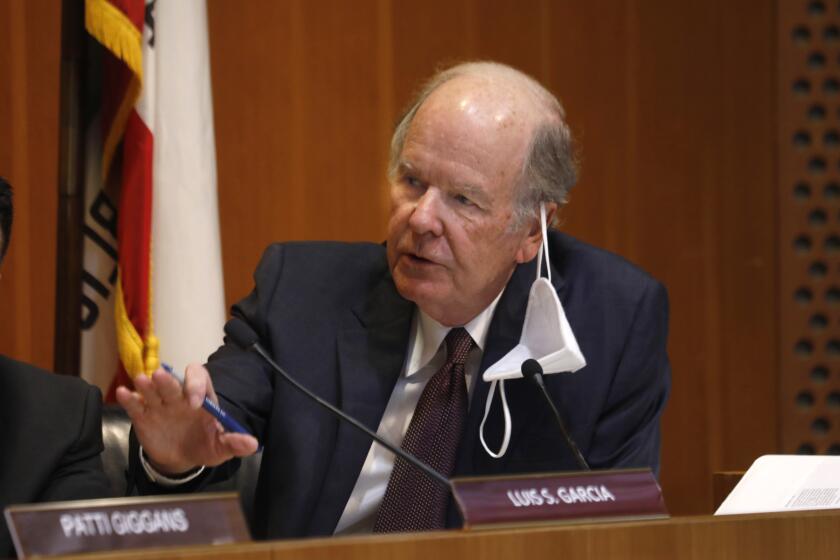Compromise on Ethics Reforms Is Announced
- Share via
Several key City Council members and the head of the mayor’s ethics commission announced a compromise Wednesday on a sweeping package of ethics reforms that would restrict outside income for public officials and would establish publicly financed elections.
The compromise was reached after weeks of rancorous public debate and private arm-twisting, and comes just days before the council’s self-imposed deadline for passing ethics reforms.
The council is attempting to head off a threatened citizens’ initiative that would embrace the wide-ranging recommendations of an ethics-in-government commission appointed by Mayor Tom Bradley a day after his narrow election victory last spring.
The agreement was hammered out by Councilman Michael Woo, chairman of the council’s Ad Hoc Committee on Ethics, and Geoffrey Cowan, chairman of the mayor’s commission. If the council approves the agreement substantially intact, there will be no citizens’ initiative on the ballot, Cowan said at a press conference Wednesday.
In the compromise, Cowan backed away from a demand for a total ban on outside earned income for public officials. Instead, public officials would be prohibited only from doing work for firms that are located in or do business with the city of Los Angeles. Work for other firms would be permitted with prior permission from a new city ethics commission, which would rule on possible conflicts of interest.
The outside work ban would apply to about 1,500 of the city’s 45,000 employees. While elected officials and top policy makers would have to get permission from the five-member ethics commission for outside employment, others would have to get the approval of their department heads.
The compromise also provided a higher level of public financing for political campaigns. The mayor’s commission had proposed matching funds generally equal to one-third of a candidate’s total contributions. However, Woo prevailed in getting the amount raised to one-half. The matching funds would be paid from the city’s general fund.
In return for accepting the public funds, City Council candidates would have to limit their spending to $400,000 per race. Mayoral and other citywide candidates who accept the matching funds would face a $2-million expenditure limit.
Spending limits “dramatically reduce influence of special interests,” Cowan said.
The cost to the city of providing matching funds has not yet been calculated, he said.
Woo called the package “the toughest, most comprehensive code of government ethics in the nation,” and said he is now “much more confident that this package can win the support of the City Council.”
The package was also endorsed Wednesday by City Council President John Ferraro and Councilman Marvin Braude.
Woo said the measure now has the support of “council leadership,” but the 15-member body is a loosely organized group with frequently shifting coalitions.
Some council members have said privately that they would support the package--and its restrictions on outside income--in return for a substantial pay raise. The most frequently mentioned figures would link pay for council members, who now get $61,522 a year, to that of Municipal Court judges, who get about $80,000 a year. A pay-raise proposal also would include an increase for the mayor, who is paid $102,537.
However, Woo, who has been aggressively lobbying his fellow council members for the last week to win their support for the package, said that the pay raise and the ethics package are not linked and no pay raise has been formally proposed.
It was unclear Wednesday whether other members of the council, who are widely divided on the issue, will endorse the agreement.
“That’s only three votes--maybe,” said one council member who asked not to be named. He predicted that the package may undergo substantial changes on the council floor.
Sources said Councilwoman Ruth Galanter, a vocal critic of some aspects of the reform, could not be persuaded to attend the press conference.
Many of the provisions contained in the lengthy package must be approved by the voters. Woo said Wednesday at least two separate measures probably will be on the June ballot, one dealing with ethics provisions and the other with public campaign financing.
The package is scheduled for a vote in the council’s ethics committee today. By heading off the citizens’ initiative, the council was able to maintain control of the details of the ethics regulations.
Bradley was not invited to the press conference Wednesday, but aides said he had been kept apprised of the negotiations. In a written statement, Bradley said he was pleased with the proposal.
“I am hopeful the City Council can act by Feb. 12 in order to get this ethics package before the voters on the June ballot,” Bradley said.
The proposal also would bar public officials from accepting honoraria, free trips and most gifts from persons other than relatives.
One particularly controversial section is the “revolving door” provision, which bars elected officials and other top policy-makers from lobbying any city department for a year after they leave office or quit their jobs.
Most council members have been skittish about speaking out publicly against the ethics package, but some said privately Wednesday that chances of the measure passing as-is are slim.
More to Read
Sign up for Essential California
The most important California stories and recommendations in your inbox every morning.
You may occasionally receive promotional content from the Los Angeles Times.













